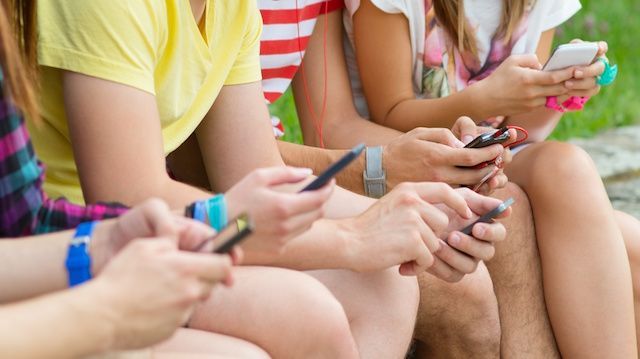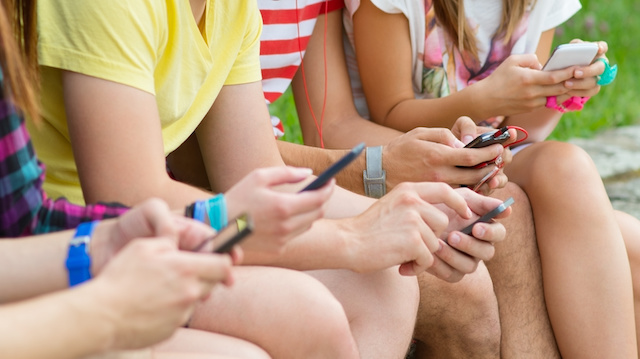
Put down your phone and think. Think about how many minutes you spend with this piece of metal each day. I don’t mean how many minutes you spend on your phone, using your phone… I mean how many minutes you spend every single day with your phone. Are your starting to see where I am going with this?
If you are anything like me, you probably spend every waking moment with your phone. It is in your pocket, on your hip, on the table or armrest of the couch right next to you, within easy reach, and never out of sight.
I even set my phone on the bed just under the edge of my pillow while it is charging at night. It is never turned off. It keeps me informed anytime an “important” piece of information presents itself in a text, a Facebook update, an email, a Tweet, an Instagram photo… the list goes on indefinitely in a chaotic whirlpool of constantly changing statuses, current events, and urgent sales.
Is it possible that our phones have crossed a line? Have they breached some kind of sacred barrier and taken a place of emotional importance in our lives that a piece of inanimate, lifeless metal and plastic has no right to hold?
We have created emotional bonds with our phones
A term has been coined to describe the result of being with our phones on such a consistent basis. “Nomophobia” or “no-mobile-phone phobia” is the fear of being without one’s mobile phone. It has been summarized by two primary symptoms.
- A certain panic or distress when a person does not have their phone.
- A lack of ability to complete everyday tasks without the aid and assistance of a phone.
Have you ever lost your phone or broken it and had to wait for several days to get it replaced? Many people in this situation would feel a certain level of anxiety and find themselves frequently reaching for their pocket to find the phone.
Normally we would fill waiting periods with staring at the screen while playing a game, scrolling endlessly through news feeds, or even going back and forth mindlessly between apps. Instead we sit there fidgeting and trying to figure out what to do with so much time.
How often do you use your phone to complete everyday tasks? We use phones for talking, emailing, texting, getting directions, adding, subtracting, multiplying, dividing, reminding, setting alarms, taking notes, scheduling calendar events, etc. What if you suddenly did not have this tool to help you with these tasks? Could you function without it?
Nomophobia has psychological effects
When we have such an easy source of information, we have very little incentive to truly learn things or to remember information. The knowledge is right there in our pockets all the time, so why bother to remember things! Albert Einstein was rumored to have indicated that, despite his vast knowledge and intelligence, he had never bothered to memorize his own phone number because he wanted to save room for more useful information.
Unfortunately our reasons are far less lofty and far more lazy. I, for one, know a grand total of three phone numbers, and one of them is my own. All of the rest are stored in my phone and available with a few strokes. I can type a question into a search engine and have an answer to a complex scientific concept in a matter of seconds, but there is little motive for me to learn more about the topic than what I needed to know for this isolated situation.
 Obviously there are significant advantages to having so much information within easy reach, but this has created a dependency on our phones similar to the attachment we have to our loved ones. We rely on them for so much that we neglect to learn how to do things independently. Many of us would be quite helpless without this handy tool to give us all the answers.
Obviously there are significant advantages to having so much information within easy reach, but this has created a dependency on our phones similar to the attachment we have to our loved ones. We rely on them for so much that we neglect to learn how to do things independently. Many of us would be quite helpless without this handy tool to give us all the answers.
How do we know if we are too attached to our phones?
Recently a test was devised to help determine just how addicted we are to our phones. It is called the Nomophobia Questionnaire or NMP-Q. It asks 20 questions about different facets of a person’s feelings in regards to being without their phone, and presents scenarios for the person to agree or disagree with on a 1–7 scale.
Now it seems to be a rather subjective test and results could very easily be skewed by personal bias and self-denial. But with or without this test, it seems clear the majority of us spend far too much time on our phones and have become far too emotionally attached to and dependant on these portable devices. We need to be prepared for anything that comes into our lives. If we always rely on phones to guide us around town, tell us when to get up, and instruct us on how to cook a simple meal, we are functioning below our true potential.
If we don’t know what to do with our free time other than to fill it with mindless, unproductive scrolling and surfing, how will we ever be able to get ahead in life and accomplish things that are worthwhile? If we have our noses buried in screens, we are missing all the precious moments with our friends and loved ones that make life special.
We should all do ourselves a big favor and unplug every now and then. Our jobs, our families and even our own bodies will thank us.
—Kyle Kramer
Kyle is an outdoor enthusiast with a passion for nature and sustainability. When he is not writing, you will find him in his workshop crafting with local wood, hiking in the Arizona mountains, fly fishing, horseback riding or putting together a healthy meal in the kitchen.

